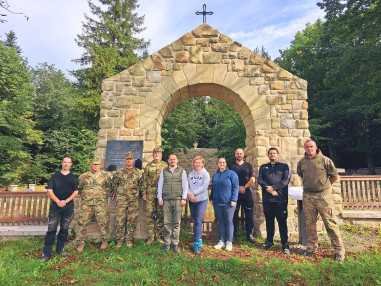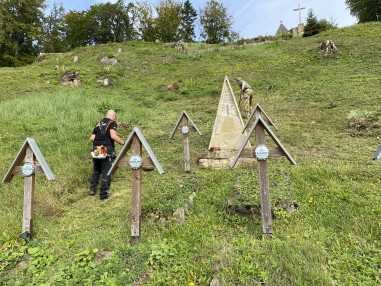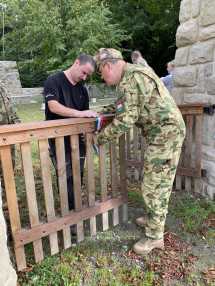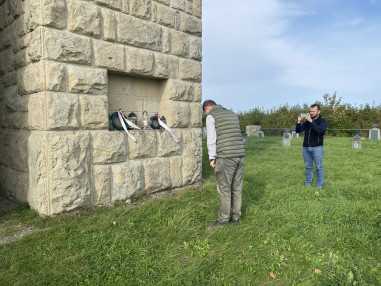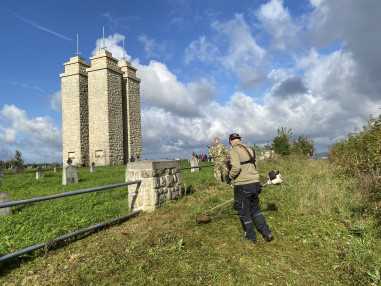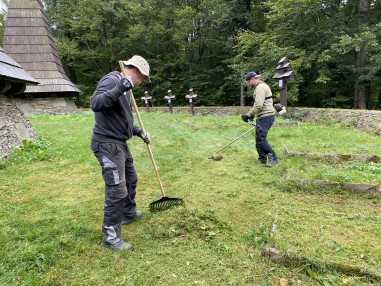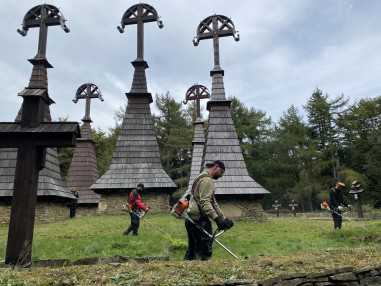Collective war grave care in Southern Poland
Text: Flóra Stósz | Photo: MoD MHIM, Hungary’s Consulate General/Kraków | 18:53 October 24, 2023A working group from the War Grave Care and Hero Worship Directorate of the MoD Military History Institute and Museum (MoD MHIM WHD) was tending to war graves in WWI military cemeteries in the area of Lesser Poland Voivodeship between 5 and 7 October.
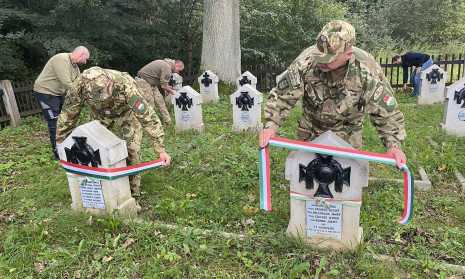
Organized from members of the Warsaw Police Headquarters, the Mountain Eagles Club (Klub Górski Orły) organized the care of WWI military cemeteries in Southern Poland already for the eighth time. Year after year, more and more people join this initiative, and this year, besides Warsaw policemen, members of the Kraków and Tarnów territorial defence forces and border guards from Nowy Sacz, a delegation of the MoD MHIM WHD also participated in the event.
On the first day of the event, the Hungarian working group collaborated with the staff of Hungary’s Consulate General in Kraków as well as with Polish soldiers and volunteers in tending to the war graves of military cemetery No. 123 in Luzna. After the work, together with the team of the consulate general, they placed tealights and Hungarian ribbons in military cemeteries No. 118 (Staszkówka), No. 120 (Luzna-Podbrzeze), No. 121 (Biesna), No. 134 (Siedliska), No. 184 (Brzozowa), as well as stones on the heroes’ graves of the Jewish cemetery No. 132 in Bobowa.

On the second day of the event, the working group of the MoD MHIM WHD was tasked with refurbishing military cemetery No. 118 in Staszkówka, with assistance from the students of the School Complex of the Agricultural Education Centre of Bystra headed and directed by Marta Piecuch, and from members of the Ciezkowice Catholic Youth Association directed by the local parish priest, Adrian Fyd. After cleaning up the cemetery, at the invitation of Klub Górski Orly, the Hungarian group visited military cemetery No. 55 in Gladyszów, where it provided assistance to Polish volunteers in cleaning the environment. The second day of the work fell on 6 October, the Memorial Day of the Martyrs of Arad, so having finished the day’s work, the Hungarian delegation visited Gromnik, where it placed a Hungarian band on the tomb of Major Knight Edward Dzwonkowski, a honvéd officer of the 1848/49 War of Independence.
On the third, and at once last day of the event, the volunteers of Klub Górski Orly and the delegation of the MoD MHIM WHD carried out the necessary refurbishment works in military cemetery No. 51, Rotunda. The war grave caretakers were not discouraged by having to access the cemetery on foot, as it is located atop Rotunda Hill, which has very steep slopes. In the evening, tired from the hard work, the Polish and Hungarian war grave caretakers were invited to the closing ceremony of the event, organized in Dlugosz Palace, Gorlice.
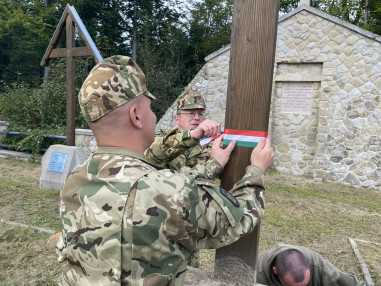
Several invitees attended the ceremony, among them Dr. Lenka Pifková, Slovakia’s Consul General in Kraków; M. A. Martin Gärtner, Austria’s Consul General in Kraków; Dr. Tibor Gerencsér, Hungary’s Consul General in Kraków; Lieutenant Colonel Antal Csík, Hungarian military attaché in Warsaw; Dr. Andor Bíró, Director, MoD MHIM WHD; General Dr. Johannes Kainzbauer, Upper Austrian President of the Austrian Black Cross (Österreichisches Schwarzes Kreuz Kriegsgräberfürsorge), as well as representatives of the Polish governmental and local public administration. At the event, Jacek Witas, President, Klub Górski Orly gave a presentation on the work done in WWI military cemeteries during the seventh cemetery cleaning action last year. Speeches were delivered by Mayor of Sekowa Malgorzata Maluch, Hungary’s Consul General in Kraków Dr. Tibor Gerencsér and Joanna Florkiewicz-Kamieniarczyk, Director, Department of the Conservation of Monuments of Kraków and National Heritage, Provincial Office, Lesser Poland Voivodeship.
